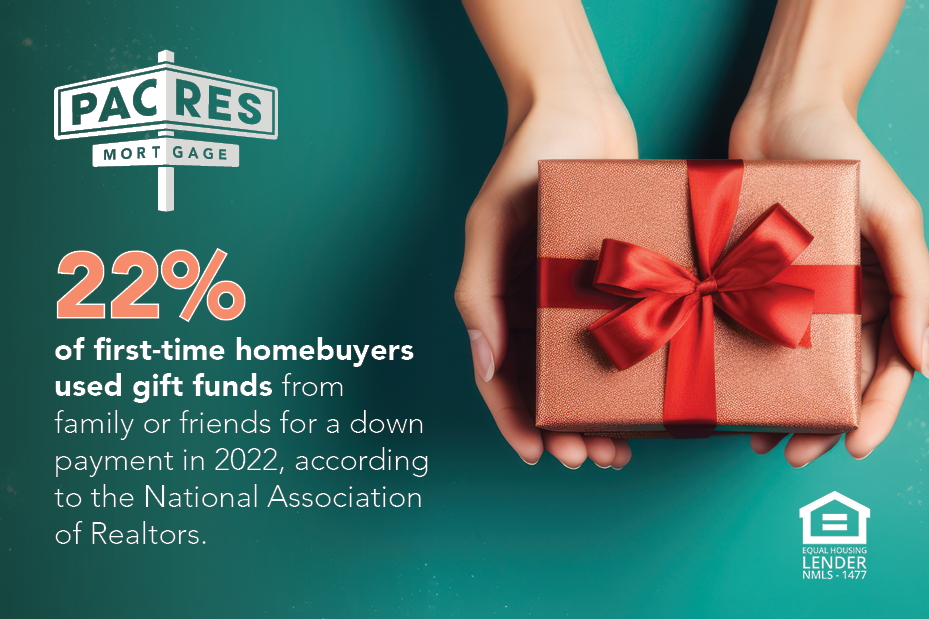The Millennial Homebuyer’s Guide: Overcoming Financial Hurdles
Venessa Eck, Sr. Mortgage AdvisorJanuary 1, 2024 — 12 min read

Currently, millennials make up about 43 percent of home buyers—that’s the most of any generation, according to the National Association of Realtors. In fact, with 4 out of 5 younger millennials (those born from 1993-1997) purchasing for the first time, this dynamic demographic is quickly
reshaping the real estate market.
However, millennials face unique financial challenges that other hopeful homebuyers may not: whether wrestling with student loans, managing credit card debt, or saving up for a down payment, these challenges underscore the intricacies of navigating today’s real estate market if you’re just starting out.
This year, let’s flip the script—below, explore how PacRes Mortgage can be a guiding light through these intricacies, turning hurdles into stepping stones.
Common Financial Challenges for Millennial Home Buyers
Student debt.
One of the biggest challenges stemming from student debt is its direct impact on the ability of young borrowers to save up for a down payment. With a significant portion of income dedicated to servicing student loans, the traditional route to homeownership can become a slow and arduous journey.
Impact on debt-to-income ratio (DTI)
Student debt can contribute significantly to your overall debt load, affecting your debt-to-income ratio. Lenders look closely at this crucial metric when evaluating mortgage applications. High debt-to-income ratios may impact mortgage approval or result in less favorable terms.
Strategies to balance student debt and homeownership goals:
Debt consolidation
Navigating student debt goes beyond monthly payments, especially if you already own a home; for most, debt consolidation involves working with a professional to strategically positioning yourself to achieve your long-term goals.
- What’s a debt consolidation refinance? Simply put, this a debt consolidation refinance involves replacing your current mortgage with a new one that carries a higher principal amount; this additional sum enables you to settle high-interest debts such as credit cards, student or auto loans, personal loans, or medical bills. The advantage lies in consolidating these debts within your mortgage, granting you access to lower interest rates and more easily manageable monthly payments.
Employer assistance programs
Some companies provide financial assistance to help employees with the cost of purchasing or owning a home, typically in neighborhoods close to the workplace. The PacRes Mortgages at Work Program enables employers to provide a no-cost, high-reward addition to benefit packages through a lender-provided closing cost credit on a mortgage purchase or refinance.
Work with a knowledgeable Mortgage Advisor
While the idea of managing student debt alongside the desire to own a home may seem daunting, it’s far from insurmountable. By leveraging the assistance of your experienced neighborhood Mortgage Advisor, you can navigate financial obstacles with expertise, bringing you closer to your homeownership objectives. Click here to discover the difference today.
RELATED: Student Loans and Getting a Mortgage: What You Need To Know

Credit Score.
Your credit score can also be powerful gatekeeper to homeownership. Serving as a numerical representation of creditworthiness, it plays a pivotal role in determining mortgage eligibility and the interest rate you receive on your mortgage.
Impact on interest rates
Credit scores play a significant role in determining the interest rates offered on mortgages. Lenders typically have minimum requirements for mortgage applicants, depending on the loan type; generally, a lower score results in a higher risk perception, potentially leading to rejection or approval with less favorable terms. This, in turn, can prolong the homeownership journey and increase the overall cost of homeownership.
Millennial homebuyers facing credit score challenges can take proactive steps to improve their scores:
Timely payment of debts
Consistently paying bills and debts on time is essential to maintain a healthy credit score. Payment history is one of the most significant factors considered in credit scoring models. For millennial homebuyers, this means being diligent about meeting due dates for credit card payments, loan installments, and other financial obligations. Setting up automatic payments, creating calendar reminders, and establishing a budget to ensure funds are allocated for timely payments are practical strategies to prioritize this crucial aspect of credit management.
Credit utilization management
Credit utilization refers to the ratio of credit card balances to credit limits. Keeping credit card balances low in relation to credit limits is viewed positively by credit scoring models; ideally, you should aim to utilize only a small percentage of available credit. This not only helps improve credit scores but also demonstrates financial responsibility.
Review credit report errors
Credit reports can sometimes contain errors, such as incorrect account information, inaccurately reported late payments or accounts that don’t belong to the individual. These errors can significantly impact credit scores and, consequently, your ability to secure favorable terms. Millennial homebuyers should obtain free annual credit reports from each of the major credit bureaus and carefully review them for any discrepancies. If errors are identified, prompt action should be taken to dispute and correct the inaccuracies.
RELATED: How to Fix Errors on Your Credit Report
By actively engaging in these strategic measures, millennial homebuyers can not only bolster their credit scores, but also pave the way for a smoother and more favorable journey towards realizing their dreams of homeownership.
Lack of Financial Education
The absence of a robust understanding of financial principles can hinder hopeful homeowners’ ability to make informed decisions, potentially impacting the homeownership journey in several ways:
Understanding mortgage terms
Understanding basic mortgage terms is crucial for prospective homebuyers navigating the housing market. It ensures you are able to decipher financial jargon, better equipping you to comprehend loan agreements and effectively compare mortgage options. Click here to explore our mortgage glossary.
Budgeting
Financial literacy plays a key role in creating and managing a budget tailored to homeownership. Prospective homebuyers need to understand not only the costs associated with purchasing a home but also the ongoing expenses of homeownership. This includes property taxes, homeowners insurance, utility bills, and maintenance costs. Without a solid budgeting foundation, you may find it challenging to allocate resources appropriately, potentially leading to financial strain and difficulties in meeting financial obligations.
Long-term financial planning
Homeownership is a long-term commitment, and understanding how it fits into broader financial objectives, such as retirement planning, education savings, and wealth accumulation, enables individuals to make informed decisions that align with their overall financial well-being. Without this understanding, homeowners may face challenges in balancing immediate housing needs with long-term financial aspirations.
Navigating mortgage programs
This involves understanding the various mortgage options, government programs, and incentives available to homebuyers. Understanding the differences between fixed-rate and adjustable-rate mortgages, as well as government-backed loans such as FHA, VA, or USDA loans, is crucial for making informed decisions. Each program has its own eligibility criteria, down payment requirements, and implications for long-term financial commitments. Contact your neighborhood Mortgage Advisor to explore options today, or click here to learn more.
Emergency preparedness
Homeownership comes with unforeseen expenses, such as emergency home repairs or sudden job loss. Establishing and maintaining an emergency fund is a fundamental aspect of long-term financial planning.
Eric Wiley, executive vice president and co-founder of PacRes Mortgage, hosts a video series to highlight important facts and happenings in the mortgage and housing industries. Click here to watch the latest episode.

Down Payment Struggles
Down payment struggles can pose a significant barrier to achieving homeownership, especially for those who are just starting out or those who have limited financial resources. Insufficient funds for a down payment can impact the type of mortgage a homebuyer qualifies for and may result in higher overall costs.
Different loan types may require different down payment percentages; being aware of these requirements helps you to plan and save accordingly:
Conventional loans. Conventional mortgages typically require a down payment of at least 3% to 20% of the home's purchase price. The specific percentage depends on factors such as the borrower's credit score, financial history, and the loan-to-value ratio.
FHA loans. The Federal Housing Administration (FHA) offers loans with lower down payment requirements, often as low as 3.5%. This makes FHA loans more accessible for those who are still building their financial resources, but it's essential to understand associated mortgage insurance premiums.
VA loans. For eligible veterans, active-duty military, and surviving spouses, these loans provide a unique opportunity to purchase a home without the need for a down payment. Eligible individuals can finance the entire purchase price of the home, making VA loans an attractive option for those with limited financial resources.
USDA loans. The U.S. Department of Agriculture (USDA) provides loans for rural homebuyers with little to no down payment requirements; knowing the geographical eligibility criteria for USDA loans can open up additional options for those struggling with down payment funds.
Explore down payment assistance programs
Fortunately, for those facing down payment struggles, there are down payment assistance programs available to help bridge the financial gap. These programs aim to provide financial support to homebuyers, particularly those with limited resources.
Who may qualify for down payment assistance:
- First-time homebuyers
- Individuals with incomes below the area median levels
- Borrowers lacking sufficient funds for a down payment
- Homebuyers residing in rural areas
- Veterans and active military personnel
- Individuals with disabilities
- Homebuyers meeting credit and other eligibility requirements established by the program
There's a down payment assistance product for everyone—if you're not sure which one is right for you, click here to learn more, or connect with your neighborhood Mortgage Advisor today.
Explore alternative down payment sources
In addition to formal down payment assistance programs, there are alternative sources to consider when tackling down payment challenges. These alternatives can supplement your efforts to secure the necessary funds for homeownership:
Gift funds. One alternative avenue for alleviating down payment struggles is to receive a financial gift from family members or friends. However, it's crucial to navigate this option carefully, keeping in mind both lender requirements and interpersonal considerations.
- Lender requirements. Lenders typically mandate a gift letter, confirming funds are a gift, not a loan, detailing the donor's relationship, amount, and a no-repayment statement; documentation, such as bank statements, is often required from both donor and recipient for transparency and compliance.
- Relationship dynamics. Open communication is crucial between the donor and homebuyer to discuss expectations, the gift's purpose, and potential implications, preventing misunderstandings. Considering the impact on relationships, setting clear terms, and expressing gratitude is essential for maintaining healthy dynamics.

RELATED: The Perfect Holiday Gift--Money for a Down Payment?
Government grants. Government grants are another avenue to help ease down payment challenges, as various agencies provide financial assistance in the form of grants or low-interest loans.
- Local programs: Start by researching down payment assistance programs offered by local municipalities or county governments. Local initiatives may be tailored to address specific housing needs within the community.
- State programs: Many states have their own housing finance agencies or departments that administer assistance programs. These programs may have broader eligibility criteria and offer additional financial support.
- Federal programs: Explore federal government programs that help with homebuyers. These initiatives may be more expansive in scope and offer resources on a national level.
RELATED: What is a First-Time Homebuyer Grant?
Community programs. Some communities have specific programs or grants aimed at promoting homeownership. PacRes Mortgages’ Our Neighbor Community Lending Program offers improved pricing and no income restrictions for eligible borrowers. Click here to learn more.
What Other Homebuying Hurdles do Millennials Face?
Low Inventory.
When there is a low housing inventory, the supply of available homes falls short of meeting the demand, resulting in heightened competition among buyers or renters, escalating prices, and a restricted range of choices. This imbalance presents a formidable challenge for individuals and families seeking suitable and affordable housing, often leading to frustration and difficulties in securing a home that aligns with their needs.
Why is home inventory so low?
Historically low interest rates in 2020 and 2021 led to a surge in home purchases. However, recent increases in mortgage rates have made homeowners reluctant to buy new properties. Simultaneously, a shortage of available housing is exacerbated by challenges in new construction, including rising material costs and a skilled labor shortage. Remote work, a lasting impact of the pandemic, has also influenced housing dynamics.
Rates.
Fluctuating interest rates is another critical consideration in today’s housing market. The historically low interest rates in 2020 and 2021 fueled a surge in home purchases, with buyers taking advantage of favorable financing conditions. However, recent increases in mortgage rates have introduced a new layer of complexity. Homeowners, now facing higher rates, are hesitant to enter the market for new properties, contributing to the ongoing challenge of low housing inventory.
Recession fears.
One other significant homebuying hurdle for today’s buyers is fear of an impending recession. Economic uncertainties and concerns about a potential downturn can make prospective buyers hesitant, and the lingering effects of the pandemic and global economic shifts have heightened these anxieties.
This fear can impact decision-making, leading some millennials to postpone or reconsider their homebuying plans—however, with a trusted mortgage professional at your side, navigating these uncertainties becomes safe and easy. From pre-approval to closing, and beyond, your neighborhood advisor can provide insights, guidance, and strategies to help you make informed decisions despite economic concerns or other financial hurdles.
RELATED: From Fright to Freedom: Exorcising This Year’s Top Mortgage Fears
Take a Confident Next Step Today
Hesitant to make a move in today’s housing market? There’s no question to big or too small—our knowledgeable Mortgage Advisors are passionate about what they do and here to help you through every step of your home finance journey, and beyond. Click here to get started today.
Categories
Archives
Recent Posts
- No Down Payment for First-Time Homebuyers
- How Does A 30-Year Mortgage Work: A Simple Guide
- Your Comprehensive Homebuying Checklist: A Step-By-Step Guide
- Mortgage Pre-Approval: Everything You Need to Know
- What Are the Benefits of a USDA Loan for Homebuyers?
- How Many People Can Be On A Home Loan? Your 2024 Guide
You bring the dream. We'll bring the diagram.
There’s a financing solution for just about every situation.
I felt like I was treated like family, great communication and helping me with any questions I had.

You bring the dream. We'll bring the diagram.
There’s a financing solution for just about every situation.
Where does your sun shine? Find your local advisor.
Enter your city or state to see advisors near you.
